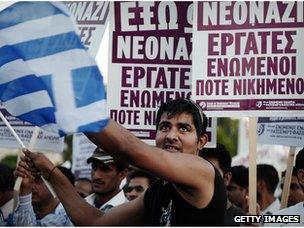Greece wrestles with rise in hate crime
- Published

Demonstrators have protested against attacks on immigrants
Greece's politicians and press are agonising over a wave of attacks on immigrants, and what to do about it.
Justice Minister Antonis Roupakiotis threatened tougher punishment for ethnic crimes, with sentences of over three years in jail for those who attack migrant workers.
The public order ministry also said it would no longer provide police guards for MPs from the far-right Golden Dawn party, which is seen by many as a key factor contributing to the climate of xenophobia in Greece.
The party, which won 18 seats in parliament in June, blame some of the country's economic problems on illegal immigration.
Hate attacks
Earlier, Javied Aslam, the head of the Migrant Workers' Association in Greece and leader of the Greek Pakistani community, said hundreds had been injured in racially motivated attacks.
"In the past six months, knife-wielding fascists have attacked some 500 persons with impunity from the police," he said.
The attacks have drawn strong condemnation from officials.
"The rise in hate attacks against foreigners is starting to take a dangerous direction," Justice Minister Antonis Roupakiotis said. "The country's acute migration problem and its consequences cannot, of course, be dealt with using inhumanly violent means."
Athens Mayor Giorgos Kaminis also urged punishment for the attackers: "When fellow human beings are being stabbed on an almost daily basis, society has to be alert and the state has to bring the perpetrators to justice."
'Is there no prosecutor?'
Some, however, have accused the authorities of inaction.
"Is there no judge left in Athens? Is there no prosecutor?" commentator Paschos Mandravelis asked on the Kathimerini website.
"There appear to be gangs of criminals that drive around the city beating, stabbing and killing fellow humans and yet no state authority seems willing or able to do anything about it."
"The Greek press is rife with reports of 'attacks carried out by members of Golden Dawn', the country's neo-fascist political party," the comment piece went on. "However, no prosecutor seems to be looking into the allegations."
The left-wing opposition party Coalition of the Radical Left, known as Syriza, blamed the government for the wave of attacks on migrants, accusing it of creating a "political climate of targeting immigration as the cause of all of the country's woes".
In an article headlined "Uncontrollable beast" on the Protagon website, journalist and blogger George Karelias criticised the security services for failing to act against hate crime, arguing that this inaction not only emboldens and encourages the attackers, but also broadens their "social base".
He also suggested that the government was unwilling to prosecute right-wing perpetrators for fear of "heroicising" them. "Greek society has become a mess that very easily accepts neo-fascist practices in the name of its own 'protection'," Karelias said.
Golden Dawn criticised
One incident attracted particular attention in the media and among officials.
On 7 September, a group of several dozen flag-waving Golden Dawn supporters clad in black T-shirts raided a street market in Rafina, northeast of Athens. A video clip posted online showed them checking migrants' papers and overturning their stalls, leaving merchandise strewn on the ground.
It also featured a Golden Dawn MP saying he had to step in where the police had failed in order to drive out "illegal vendors".
Speaking after the incident, Justice Minister Antonis Roupakiotis said that "the Golden Dawn's actions are offensive to traditional democratic principles and are creating the conditions for neo-fascist practices in the country".
"Any manifestation of violence or hate against either immigrants or Greek citizens must be condemned and punished," the minister said, warning people against "acting in place of the state".
This sentiment was echoed by an article on To Vima website, headlined "No to the Golden Dawn's state within the state".
The Golden Dawn raid in Rafina prompted the authorities to suspend the local police chief and launch an inquiry. Following assertions from Golden Dawn that it intends to continue policing street markets, the public order ministry also said it would not longer provide police guards to the party's MPs.
reports and analyses news from TV, radio, web and print media around the world. For more reports from “óĻó“«Ć½ Monitoring, click here
- Published6 August 2012
- Published16 August 2012
- Published1 August 2012